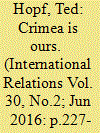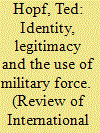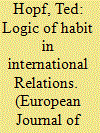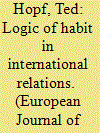|
|
|
Sort Order |
|
|
|
Items / Page
|
|
|
|
|
|
|
| Srl | Item |
| 1 |
ID:
120165


|
|
|
|
|
| Publication |
2013.
|
| Summary/Abstract |
The IR literature on hegemony rarely combines attention to material power and ideas. Cox's neo-Gramscian work is a rare exception, but it too narrowly construes Gramsci's conceptualization of common sense, reducing it to elite views on political economy. But Gramsci argued that hegemony had to reckon with mass quotidian common sense. If political elites do not take into account the taken-for-granted world of the masses, elite ideological projects would likely founder against daily practices of resistance. In this article, I show how mass common sense can be an obstacle to an elite hegemonic project aimed at moving a great power into the core of the world capitalist economy. In contemporary Russia, a ruling elite with a neoliberal project is being thwarted daily by a mass common sense that has little affinity with democratic market capitalism. Scholarly work on future Chinese, Brazilian, or Indian participation in constructing a new hegemonic order would do well to pay attention to the mass common senses prevailing in those societies
|
|
|
|
|
|
|
|
|
|
|
|
|
|
|
|
| 2 |
ID:
146006


|
|
|
|
|
| Summary/Abstract |
Russia could have annexed Crimea anytime in the last 25 years. The fact that it did so only in March 2014 is a puzzle. I argue that the predominant discourse of Russian national identity by 2014 made the annexation of Crimea and military intervention in eastern Ukraine both thinkable and natural to Moscow. A history of the discursive terrain of Russia from 1992 to 2014 shows how Russia’s national identity has evolved over the years, both in response to Western inactions or actions and domestic developments. But Russian identity is not a sufficient explanation for Russian behavior in Ukraine. For that, we must pay attention to the event itself: Western support for the Maidan protestors, Western failure to adhere to the February 2014 agreements reached with Moscow on a transitional government in Ukraine with Yanukovych at its head and new elections in November, the presence of disgruntled Russians in Ukraine, and perhaps most important, over a decade of US unilateralism in foreign affairs.
|
|
|
|
|
|
|
|
|
|
|
|
|
|
|
|
| 3 |
ID:
071113


|
|
|
| 4 |
ID:
101367


|
|
|
|
|
| Publication |
2010.
|
| Summary/Abstract |
IR theory is dominated by the logics of consequentialism and appropriateness. But Max Weber offered four logics of choice, not just two. Beyond the instrumental rationality of Zweckrationalität and the normative rationality of Wertrationalität are affect and habit. Drawing on Weber, James, Dewey, and Bourdieu, and habit's microfoundations in neurocognitive psychology, I explore the logic of habit and its consequences for several fundamental puzzles in IR theory. The logic of habit necessarily precludes rationality, agency, and uncertainty, and so offers a different interpretation of cooperation, security dilemmas, enduring rivalries, and security communities in international politics. The logic of habit also fills a gap in mainstream constructivism's theorization of intersubjective structures, returning the taken-for-granted lifeworld to the center of attention.
|
|
|
|
|
|
|
|
|
|
|
|
|
|
|
|
| 5 |
ID:
101374


|
|
|
|
|
| Publication |
2010.
|
| Summary/Abstract |
IR theory is dominated by the logics of consequentialism and appropriateness. But Max Weber offered four logics of choice, not just two. Beyond the instrumental rationality of Zweckrationalität and the normative rationality of Wertrationalität are affect and habit. Drawing on Weber, James, Dewey, and Bourdieu, and habit's microfoundations in neurocognitive psychology, I explore the logic of habit and its consequences for several fundamental puzzles in IR theory. The logic of habit necessarily precludes rationality, agency, and uncertainty, and so offers a different interpretation of cooperation, security dilemmas, enduring rivalries, and security communities in international politics. The logic of habit also fills a gap in mainstream constructivism's theorization of intersubjective structures, returning the taken-for-granted lifeworld to the center of attention.
|
|
|
|
|
|
|
|
|
|
|
|
|
|
|
|
|
|
|
|
|